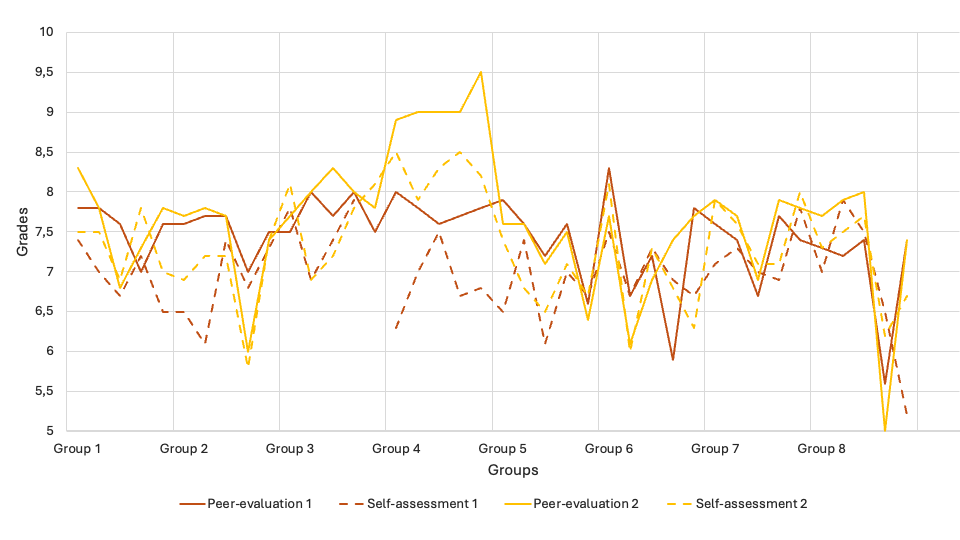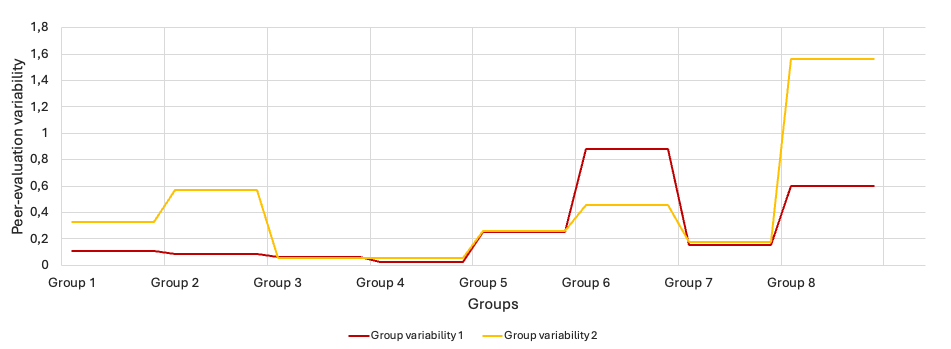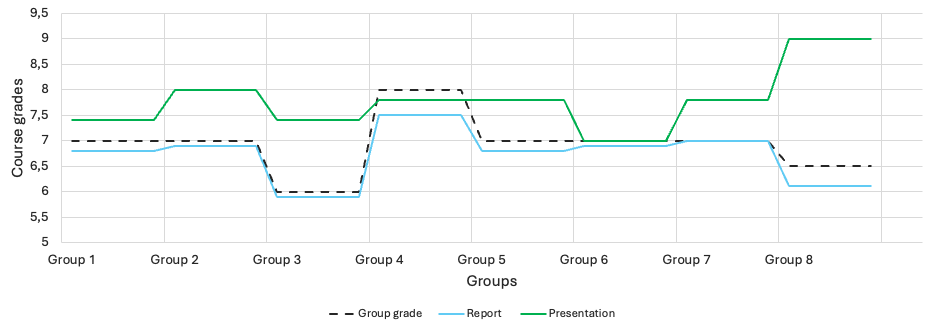Project introduction and background information
Wageningen University & Research (WUR) envisions education that is student-centred, collaborative, and prepares graduates to thrive in diverse, international learning communities (Vision for education, 2025). Collaboration skills are fundamental to this vision: they enable students to work effectively in teams, exchange knowledge, and solve complex problems—competencies essential for their professional futures. Group projects are a primary vehicle for fostering these skills, yet explicit teaching, training, and assessment of collaboration are rarely embedded in Bachelor-level courses.
In the BSc Soil, Water, Atmosphere (BSW) programme, initial steps have been taken to strengthen collaboration skills through peer-evaluation methods. Peer-evaluation—where students assess each other’s contributions in group projects—has been shown to hold individuals accountable, reduce frustration, promote fairness, and improve both performance and attitudes toward teamwork (e.g., Conway and Kember, 1993, Pfaff and Huddleston, 2003, Zhang and Ohland, 2009, Watson et al., 2010, Dingel and Wei, 2014). Our experience confirms these benefits but also reveals challenges: students often feel unprepared to evaluate peers effectively, struggle to address group dynamics, and express dissatisfaction with group grading. Additionally, biases (e.g., related to gender or race) can undermine fairness and trust in evaluations.
These findings reflect a broader issue: while collaboration is central to student-centred education, peer-evaluation skills are seldom explicitly taught or scaffolded. As a result, students may miss opportunities to develop constructive feedback techniques, conflict resolution abilities, and shared responsibility in group settings. Addressing this gap is essential to ensure group projects enhance—not hinder—students’ learning experiences and professional readiness.
This project responds to these challenges by developing and implementing a comprehensive set of peer-evaluation tools, guidelines, and training materials tailored for BSc courses. By embedding explicit instruction in how to give and receive peer-feedback, we aim to improve collaboration skills, strengthen group dynamics, and support WUR’s goal of preparing students for effective participation in interdisciplinary and intercultural teams.
Objective and expected outcomes
The objective of this project is to improve students’ collaboration skills in group projects by developing, integrating, and explicitly teaching robust peer-evaluation methods within BSc courses. By equipping students with the tools and guidance to give and receive constructive feedback, the project aims to strengthen accountability, enhance group dynamics, and ensure fair recognition of individual contributions in collaborative learning environments.
Students engaged in the project are expected to:
- Improved peer-evaluation quality: Students provide more accurate, unbiased, and constructive evaluations of peers, leading to fairer grading and reduced group conflicts.
- Enhanced collaboration skills: Students demonstrate stronger teamwork, communication, and conflict-resolution abilities in interdisciplinary and intercultural group settings.
- Higher group project performance: Group project grades increase and align more closely with student-proposed grades, reflecting improved group dynamics and accountability.
- Recognition of individual contributions: Exceptional contributions within groups are more consistently identified by teachers and supervisors through peer-evaluation data.
- Creation of a peer-evaluation toolbox: A refined set of templates, rubrics, questionnaires, and educator guidelines supports ongoing use and adaptation across diverse courses and project types.
- Long-term employability benefits: Students leave the program better prepared for collaborative professional environments where teamwork and feedback are critical skills.
Results and learnings
So far, peer-evaluation method, to support collaboration skills and personal leadership development, has been fully implemented in e.g., The integration course Soil, Water, Atmosphere (MAQ11809). It is an interdisciplinary course where students integrate knowledge from their first-year studies—covering soil geography, water, atmosphere, ecology, and supporting sciences like physics and chemistry—to analyze real-world environmental interactions. Through fieldwork, lab and computer practicals, excursions, and group projects, students investigate how land-use changes affect interconnected processes such as energy, carbon, nutrient, and water cycles. Peer-evaluation and self-assessment are performed using the questionnaire where stress is made on evaluating students’ or team members’ professional behaviour and effectiveness when working in groups on collaborative projects. The questionnaire targets competencies related to teamwork, reliability, leadership, adaptability, communication, and motivation, as well as personal work habits and resilience under pressure. In short, its purpose is to assess how individuals contribute to and perform within a collaborative, project-based working environment. Figure 1, shows the results of students' peer-evaluations and self-assessment (i.e., students evaluate themselves using the same questionnaire) performed at two stages within the course; at the proposal stage around week 4 of the course (dark red), and at the report stage, during week 8 of the course (yellow). The two stages are chosen to reflect students' performance at the beginning of the group work and at its end.

Figure 1: Peer-evaluation (solid line) and self-assessment (dashed line) conducted at two stages of the integration course, during week 4 of the course, i.e., while students are working on their project proposals (dark red) and during week 8 of the course, i.e., final week when students are working on their project reports (yellow).
Figure 1 shows that peer-evaluations (solid lines) tend to be more stable and clustered around grade 7–8, while self-assessments (dashed lines) show more variation which is especially prominent in the second phase of the course (yellow dashed line). Though they are more stable, peer-evaluations also suggest changes between the two course phases; while some students thrive in collaborative environments (e.g., assessments of students from Groups 3, 4, 7 and partly 8 increase up to 20% in comparison to the phase 1), some students do not fulfil expectations of their peers (e.g., Group 2, 6 and 8) as their evaluations drop up to 18%.
We can also see that self-assessments are consistently lower during both evaluation phases, suggesting that students cannot objectively evaluate themselves, i.e., they lack the skill of critical self-assessment. The discrepancies between self- and peer-evaluations for certain groups (e.g., Groups 4 and 8) might indicate differences in perception of contribution or performance within those teams. This can also be seen on Figure 2, representing the variability in peer-evaluations between group members at two stages of the course, i.e., proposal stage (dark red line) and final report stage (yellow line).

Figure 2: Variability in peer-evaluations conducted at two stages of the integration course, during week 4 of the course, i.e., while students are working on their project proposals (dark red) and during week 8 of the course, i.e., final week when students are working on their project reports (yellow).
Figure 2 shows that apart from Groups 6 and 8, variability in peer-evaluations is low at initial stage of the course (less than 0.3). This means that students are comfortable working with one-another, focused on the same goal, and having same expectations of the project. For some groups (Groups 3, 4, 5 and 7) the variability between two assessment moments does not change suggesting that students still have the same goals and expectations as their peers and that they contribute to the project equally. For other groups, variability at later stages of the course changes up to 97% (which is also seen in peer-evaluations on Figure 1). Here, self-reflection and personal coaching of some students in collaboration and other skills helped students improve (i.e., the variability for Group 6 decreased). For some it did not and other students (also visible in peer-assessment on Figure 1) began contributing more to the project creating bigger variability in peer-evaluations.
In summary, Figures 1 and 2 suggest overall progress and students' development of skills , but also highlight inconsistencies between self-perception and peer-evaluation, especially in the later stages of the course.
Recommendations
Future research could focus on:
- To improve and test self-assessment training – Investigate methods such as reflective exercises or explicit rubrics to help students evaluate their own performance more accurately, reducing the consistent gap between self- and peer-evaluations. This could be also connected to projects such as "Your honest mirror".
- To study group dynamics behind variability – Examine which factors (e.g., leadership changes, workload distribution, or conflict management) cause the large variability in peer-evaluations observed in some groups, especially in later stages of the course.
- To evaluate the impact of coaching and interventions – Test whether targeted coaching or collaborative skills training can stabilize group performance and improve consistency between self- and peer-assessments across different project stages.
- To evaluate individual contributions to group project - At the moment it is not known how students individually contribute to the group project, as the final grade depends mainly on the group presentation and group project report. As such, we cannot correlate higher grades of some groups to their peer performance as seen in Figure 1, and their high group functionality visible in low variability as seen in Figure 2. Future research should thus include individual-level assessments alongside group products to better capture and correlate students’ individual contributions with peer-evaluation outcomes and group dynamics.

Figure 3: Final course grades, with report grade (blue), project presentation (green) and group grade which depends also on collaborative performance (black dashed line).
